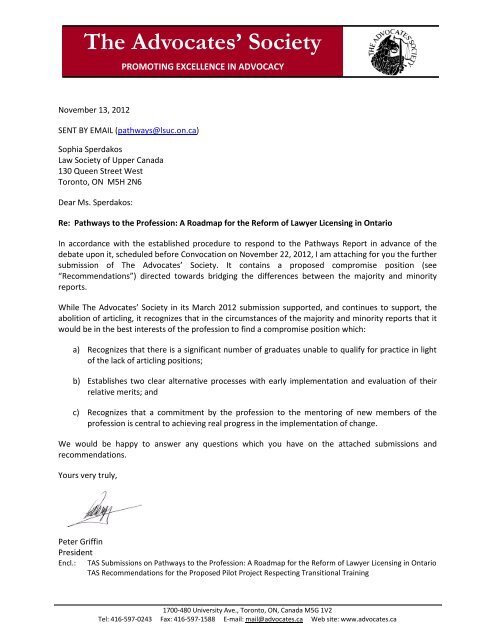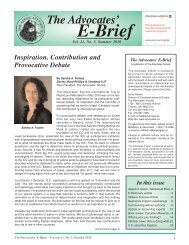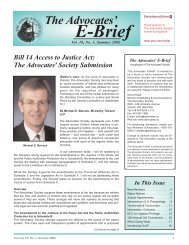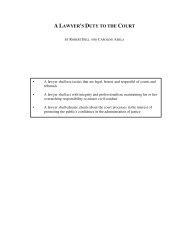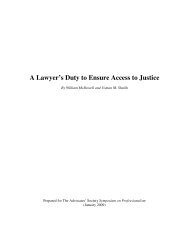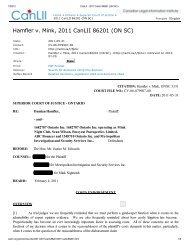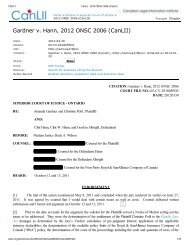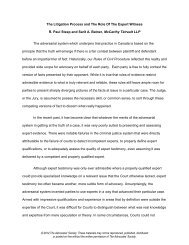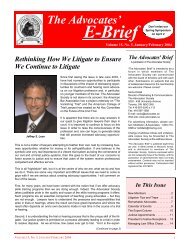Society's further submissions from November 2012 - The Advocates ...
Society's further submissions from November 2012 - The Advocates ...
Society's further submissions from November 2012 - The Advocates ...
You also want an ePaper? Increase the reach of your titles
YUMPU automatically turns print PDFs into web optimized ePapers that Google loves.
<strong>The</strong> <strong>Advocates</strong>’ SocietyPROMOTING EXCELLENCE IN ADVOCACY<strong>November</strong> 13, <strong>2012</strong>SENT BY EMAIL (pathways@lsuc.on.ca)Sophia SperdakosLaw Society of Upper Canada130 Queen Street WestToronto, ON M5H 2N6Dear Ms. Sperdakos:Re: Pathways to the Profession: A Roadmap for the Reform of Lawyer Licensing in OntarioIn accordance with the established procedure to respond to the Pathways Report in advance of thedebate upon it, scheduled before Convocation on <strong>November</strong> 22, <strong>2012</strong>, I am attaching for you the <strong>further</strong>submission of <strong>The</strong> <strong>Advocates</strong>’ Society. It contains a proposed compromise position (see“Recommendations”) directed towards bridging the differences between the majority and minorityreports.While <strong>The</strong> <strong>Advocates</strong>’ Society in its March <strong>2012</strong> submission supported, and continues to support, theabolition of articling, it recognizes that in the circumstances of the majority and minority reports that itwould be in the best interests of the profession to find a compromise position which:a) Recognizes that there is a significant number of graduates unable to qualify for practice in lightof the lack of articling positions;b) Establishes two clear alternative processes with early implementation and evaluation of theirrelative merits; andc) Recognizes that a commitment by the profession to the mentoring of new members of theprofession is central to achieving real progress in the implementation of change.We would be happy to answer any questions which you have on the attached <strong>submissions</strong> andrecommendations.Yours very truly,Peter GriffinPresidentEncl.: TAS Submissions on Pathways to the Profession: A Roadmap for the Reform of Lawyer Licensing in OntarioTAS Recommendations for the Proposed Pilot Project Respecting Transitional Training1700-480 University Ave., Toronto, ON, Canada M5G 1V2Tel: 416-597-0243 Fax: 416-597-1588 E-mail: mail@advocates.ca Web site: www.advocates.ca
<strong>The</strong> <strong>Advocates</strong>’ SocietyPROMOTING EXCELLENCE IN ADVOCACYSubmissions<strong>The</strong> <strong>Advocates</strong>’ Society’s Response to the Final Report of the Law Society ofUpper Canada’s Articling Task Force: “Pathways to the Profession: A Roadmapfor the Reform of Lawyer Licensing in Ontario”Date: <strong>November</strong> 13, <strong>2012</strong>Submitted to: <strong>The</strong> Law Society of Upper CanadaSubmitted by: <strong>The</strong> <strong>Advocates</strong>’ Society1700-480 University Ave., Toronto, ON, Canada M5G 1V2Tel: 416-597-0243 Fax: 416-597-1588 E-mail: mail@advocates.ca Web site: www.advocates.ca
TAS Submissions Respecting theFinal Report of the LSUC’s Articling Task ForceTAS Submissions on Pathways to the Profession:A Roadmap for the Reform of Lawyer Licensing in OntarioTable of ContentsOverview ................................................................................................................................................... 2Continuing Hardship for Candidates Without Articling Placements ......................................................... 3Elimination of Cooperative Work Placement Component of LPP............................................................. 4Early Assessment of Project ...................................................................................................................... 4Classroom Training and Workplace Training Comparison and Assessment ............................................. 5Number of Candidates Affected ............................................................................................................... 6Overview1. <strong>The</strong> <strong>Advocates</strong>’ Society (“TAS”) recognizes that if it is the will of Convocation that a transitionaltraining pilot project be approved with both an articling component and an alternative Law PracticeProgram (“LPP”) component, it would be in the best interests of the profession to find acompromise position of the majority and minority reports. TAS’s “Recommendations” in respect ofthe compromise position are set out in the appendix to these <strong>submissions</strong>. <strong>The</strong> comments thatfollow set out the reasons for the Recommendations.2. TAS believes that the goals of the proposed pilot project can be accomplished and the hardships forcandidates mitigated at the same time if the project is implemented sooner, its length and relatedcosts are reduced, and the project is supplemented with a commitment to mentoring by theprofession.3. In brief, TAS recommends that the pilot project motion proposed to Convocation in the ArticlingTask Force Final Report, dated October 25, <strong>2012</strong>, titled “Pathways to the Profession: A Roadmap forthe Reform of Lawyer Licensing in Ontario” (“Final Report”) be modified as follows:(a) Implement the transitional training pilot project at the earliest available date, by September1, 2013, but no later than January 1, 2014;(b) Reduce the length of the pilot project <strong>from</strong> the proposed five years to two years;—2—
TAS Submissions Respecting theFinal Report of the LSUC’s Articling Task Force(c) Reduce the length of the LPP by eliminating the proposed four month (17 week) cooperativework placement component; and(d) Include a commitment of the profession to the mentoring of lawyers during their first yearof practice with defined milestones and reporting to the LSUC as <strong>further</strong> approved byConvocation.Continuing Hardship for Candidates Without Articling Placements4. <strong>The</strong> LSUC’s Articling Task Force was established in June, 2011 to study the issues relating to thearticling requirement, including the increasing number of unplaced candidates. In theapproximately 18 months since that task force was established, the crisis has worsened and thenumber of candidates who are unable to find articling jobs and are adversely affected by the crisishas increased significantly.5. <strong>The</strong> Final Report informs us that these candidates will remain without relief in the form ofabridgment or exemption of this licensing requirement before the pilot project is implemented. <strong>The</strong>Final Report does not recommend the waiving of articles as a licensing condition on the ground thatit would be inconsistent and contrary to the public interest to license these hundreds of candidateswithout such transitional training.6. Accordingly, until the actual implementation of the pilot project, articling as a mandatory licensingrequirement remains a barrier to entry to the profession for hundreds of candidates who haveobtained law degrees <strong>from</strong> accredited institutions and may have otherwise demonstrated theirprofessional competency by passing the bar admission examinations set by the LSUC.7. Those candidates who are unable to find articling positions will continue to face this barrier to entryuntil the completion of the first LPP which, under the motion proposed in the Final Report, will nottake place until the spring or summer of 2015 at the earliest, with no other form of relief for thesecandidate in that interim period.8. In TAS’s view, this is simply too long a period for these candidates to wait for relief. This isparticularly so in circumstances where we as a profession must acknowledge that these candidatesare being denied entry to Ontario practice because of our own inability to provide the articlingpositions necessary to meet this current mandatory licensing requirement. Any unnecessary delay inproviding relief to these candidates is unfair and inequitable.9. TAS has earlier submitted that any artificial barriers to entry that are imposed by market conditionsthat affect existing law firms and the number of articling placements must be rejected. It is TAS’sposition that fairness dictates that all candidates be given an equal opportunity to demonstrate theability to meet all licensing requirements and that a licensing process barrier imposed by theshortage of articling positions is a fundamental access to justice issue.—3—
TAS Submissions Respecting theFinal Report of the LSUC’s Articling Task ForceElimination of Cooperative Work Placement Component of LPP10. From its review of the Final Report, TAS believes that the cooperative work placement componentof the proposed LPP may be a significant impediment to getting the project underway. <strong>The</strong> absenceof an adequate number of cooperative work placements for the LPP candidates -- and the potentialfor <strong>further</strong> delay in the implementation of the LPP for that reason -- appears to pose a significantimpediment to the commencement of the LPP as well as adding significantly to its costs.11. While the Final Report acknowledges that it is within the LSUC’s expertise to establish the standardsfor the LPP, as well as its system-wide testing and project assessment, it is clear that the Final Reportdoes not recommend that the LSUC actually play any role in LPP candidate training. If the LSUC didso, for at least part of the project, TAS believes that it would undoubtedly assist in the earlierimplementation of the project.12. TAS is advised in the Final Report that the transitional training competencies will be taught by a thirdparty provider, the program(s) will be implemented in the 2014-2015 licensing year, and that it isestimated that approximately 400 candidates will be required to take the LPP at that time, based onthe pattern of increase in candidates seeking entry to the licensing process and the ever-increasingshortage of articling positions available for them.13. <strong>The</strong> RFP bidders are asked not only to design the classroom setting training course, that is expectedto be four months in length, but also to include, as an essential component of the LPP, an additionalfour month (17 week) cooperative work placement for each LPP candidate.14. No such cooperative work program exists at present to TAS’s knowledge and no suggestions aremade in the Final Report where such cooperative work placements can be found that providesettings that replicate the “experiential opportunities” that are provided by a good articlingplacement.15. It is difficult to imagine that any service provider could be ready to provide that cooperative workplacement component by next summer. But it is anticipated by TAS that an experienced serviceprovider could be ready to provide classroom training by next summer for the candidates whocannot find articling positions. TAS also questions the willingness and ability of law firms to absorbshort-term cooperative students (particularly if they are also hiring articling students, therebycreating an overt two-tier system within some firms) and to give them meaningful hands-onexperience.Early Assessment of Project16. <strong>The</strong> Final Report proposes that the formal review of the pilot project shall only commence in thefinal year of the proposed five year project, with an assessment report to Convocation within thatyear, and with the continuation of the pilot project thereafter until Convocation determines that thepilot project should end, become permanent or result in a different approach. TAS sees no reasonfor delay in the critical assessment process.—4—
TAS Submissions Respecting theFinal Report of the LSUC’s Articling Task Forcerelatively short period, likely two years or less, given the size of the sample for assessment purposesof 3400 candidates.25. This assessment process raises another concern of TAS that the proposed cooperative workplacement component offers the potential of skewing any objective assessment of the relativemerits of each of the classroom training and workplace training tiers. This is because the assessorsmay be unable to conclusively determine if the competency in the skill tested by a successful LLPcandidate was the result of the classroom training component or the workplace training componentof the LPP.Number of Candidates Affected26. Paragraph 18 of the Final Report states that the rising (and irreversible) statistic of unplacedcandidates for articling is well-known. In March 2008, 5.8% of candidates were unplaced. By March2011, it had risen to 12.1%. As of March <strong>2012</strong> and while the LSUC Articling Task Force wascompleting its consultation with the profession, the percentage had risen to approximately 15% ofapproximately 1700 candidates, and that the overall number and percentage has increased yearover year and will continue to increase.27. Based on the proposed date of introduction of the pilot project LPP in 2014-2015, the candidateswho have been to date unable to secure an articling position will be given a first opportunity tobecome eligible to qualify through an alternative LPP process no sooner than another three yearstime. As stated above, TAS considers that this is an unjustifiably long period of time for thesecandidates to remain without relief. And also as stated above, the Final Report offers no possibilityof any form of interim relief for such candidates who continue to be foreclosed <strong>from</strong> gaining entryto the profession because of market conditions unrelated to their ability to meet licensingstandards.28. <strong>The</strong> Final Report projects the number of 400 candidates in the first LPP. That number appears to bevery conservative to TAS based on the statistics otherwise provided in the Final Report. Whateverthe actual number turns out to be, Convocation is being advised in the Final Report that it will begreater than the current number of candidates who do not have articling placement.—6—
TAS Recommendations for theProposed Pilot Project Respecting Transitional TrainingTAS Recommendations for theProposed Pilot Project Respecting Transitional Training<strong>The</strong> <strong>Advocates</strong>’ Society recommends that the proposed pilot project respectingthe transitional training component of the Law Society’s licensing process(”Project”) include the following integrated components:1. An articling component and a Law Practice Program (“LPP”) component, the purpose of whichtransitional training pathways is to examine and evaluate the merits of these pathways as part ofthe Law Society’s licensing process.2. In light of the continuing shortage of available articling positions, the LPP shall commence bySeptember 1, 2013 and no later than January 1, 2014.3. <strong>The</strong> Project shall be for two years ending on August 31, 2015.4. During the Project, data designed to enable its evaluation shall be collected and any necessaryrefinements or other policy issues related to the Project shall be considered in the ProfessionalDevelopment & Competence (“PD & C”) Committee and, where appropriate, changesimplemented during the course of the Project.5. <strong>The</strong> final review of the Project shall commence in its final year and shall be completed, with areport and proposal by the PD & C Committee for changes to the Law Society’s licensing processprovided to Convocation for its consideration, as soon as possible and no later than December31, 2015.6. As part of the Project, the 10-month articling program shall continue with its currentadministrative structure. In the period leading up to implementation of the Project, benchmarksand evaluative tools shall be established for articling principals and students to enable theeffective assessment of the merits of all aspects of the articling program, with the report andproposal to be included in the final report and proposal for changes to the Law Society’s licensingprocess to be provided to Convocation by no later than December 31, 2015.7. <strong>The</strong> Law Society shall issue a Request for Proposals (RFP) as soon as it is feasible to do so forinterested parties to submit a Proposal to provide a transparent, fair and defensible competencybasedLPP as an alternative pathway to licensing. Validated law practice skills, task andprofessionalism competencies as determined by the Law Society shall form the basis of the LPP.In the period leading up to implementation of the Project, benchmarks and evaluative tools shallbe established to enable the effective assessment of the merits of the LPP to be implementedeffective September 1, 2013.—1—
TAS Recommendations for theProposed Pilot Project Respecting Transitional Training8. <strong>The</strong> RFP shall seek proposals for the delivery of a LPP that:(i)(ii)(iii)(iv)Provides training on the established competencies;Is designed to accomplish the program goals within four months, while leaving it open topotential providers to propose a greater or lesser length of the LPP that accomplishes theobjectives of the program in the most timely and cost-effective manner; andIncorporates the use of practicing lawyers as instructors and/or in other capacities; andIncludes quality assurance assessments.9. Both transitional training pathways (articling and LPP) shall address approved competencies. <strong>The</strong>Law Society shall oversee a formal process to assess defined learning outcomes necessary forentry-level practice, based on those competencies. <strong>The</strong> assessment shall be standardized,transparent and fair. All candidates for licensing, including any otherwise exempted <strong>from</strong> the LPPor articling, shall be required to successfully complete the assessment as a requirement oflicensing.10. <strong>The</strong> assessment process shall be developed by the PD & C Committee and proposed toConvocation for its approval in the period prior to implementation of the Project.11. To enable the Law Society and the profession to make evidence-based determinations about themerits of each component of the Project, an evaluation system approved by Convocation shall bedesigned and implemented prior to the completion of the first LPP.12. During the development of the Project, the Law Society shall develop a plan to providementoring and practice support to those licensing candidates entering practice for their first yearof practice. <strong>The</strong> costs of the mentoring and the practice support system shall be subject toreview and approval by Audit & Finance and by Convocation.13. During the Project law graduates may apply for articling positions or the LPP. In the interimperiod between <strong>2012</strong> and the full implementation of the LPP alternative, those candidates whobegan the licensing process in the <strong>2012</strong>-13 licensing year (commencing May 1, <strong>2012</strong>) or earlierbut are unable to find an articling placement within the three-year period provided to completeall components of the licensing process, may maintain their status as a licensing candidate untilsuch time as they can enter and complete the LPP and all other aspects of the licensing process.<strong>The</strong> Law Society shall extend the three-year completion requirement for these candidates.14. Following Convocation’s approval of the Project:(i)(ii)<strong>The</strong> RFP shall be developed and issued to permit the implementation of the Projectwithin the timelines set out above;<strong>The</strong> RFP applications shall be considered in accordance with the Law Society’sestablished process for RFPs;—2—
TAS Recommendations for theProposed Pilot Project Respecting Transitional Training(iii)(iv)(v)(vi)<strong>The</strong> PD &C Committee shall make recommendations to Convocation on the mostappropriate approach or approaches for delivery of the LPP for Convocation’s approval;<strong>The</strong> successful provider(s) shall be chosen in accordance with the Law Society’sestablished process;Steps to implement the requirements of the Project shall be undertaken by the PD & CDepartment;Any additional policy matters to enable implementation shall be considered by the PD &C Committee and, where necessary, the PD & C Committee shall make recommendationsto Convocation for its consideration and approval.—3—


